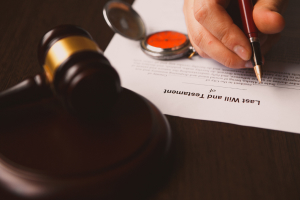This page was written, edited, reviewed & approved by Emil J. Fleysher following our comprehensive editorial guidelines. Emil J. Fleysher, the Founding Partner, has 15+ years of legal experience as a bankruptcy attorney. Our last modified date shows when this page was last reviewed.

You know that your last will and testament is an important document. But do you know how to draft one? If you are considering drafting a last will and testament on your own or are planning to get one drafted by a lawyer, this blog post is for you.
Know everything you need to learn about will writing and making it legally valid. We will take you on a step-by-step journey to make a will and answer your legal questions about drafting a will.

The last will and testament direct how you wish to distribute your assets, such as bank balances, property, or valued possessions, after death. You can also name who will receive your property and in what quantity, and authorize a guardianship arrangement for surviving dependents.
If you own a business or investments, your can also stipulate who receives them and when in your last will and testament. Additionally, you can direct assets to a charity of your choice or leave assets to a specific institution or group using a will.
A will is written while a person is still alive, and its instructions are only followed when the individual dies. The probate court frequently oversees the executor to ensure that the final wishes expressed in the will are carried out.
Ultimately, a will and testament is a legal document you can utilize to ensure your estate is settled as requested and serve as the cornerstone of an estate plan.
A court-appointed administrator will divide your assets if you die without a valid will. These third-party administrators usually use a predetermined formula set by state law to fairly partition your assets.
The surviving spouse and any children of an intestate person receive their property first, according to the California probate code (varying degrees, depending on the situation). If no instructions are provided, and there are no surviving family members, the state may be able to seize your property.

In general, if you are of legal age, usually around 18 years of age, you should be able to create a will. Additionally, you must be of "sound mind." Here's how the law identifies an individual with a sound mind:
Be aware that if you're married, in the military, or have formal emancipation, there may be exceptions to the age requirement.
Before writing your last will, you should gather some critical documents to ensure everything goes according to plan and that your final wishes are honored.
Your assets include any money you're leaving behind in your bank accounts, real and personal property, investments, retirement plans, life insurance policies, art, and other property.
You can specify how your estate should handle paying off debts using your last will and testament. Your assets will probably cover any probate fees and funeral expenses first before moving toward your unpaid bills.
When you are prepared to draft your last will, consider which of your loved ones you would like to inherit your real estate and other assets.
Although it might seem unnecessary to update your beneficiaries, remember that recent births, deaths, marriages, divorces, etc., may impact who you want to name in your will.
The executor is the person in charge of managing your estate and the instructions in your will. Your executor should be capable of handling your estate and willing to assume the duty, two things you should confirm. Having an alternate executor in mind is a good idea if your initial choice cannot fulfill its obligations.
If you have minor children, your will is an excellent document to name a guardian if their other parent cannot care for them for any reason (including if both parents die simultaneously).
Consider giving an additional option if the person you choose is unsuitable when the time comes. For example, your chosen guardian has also passed away or can no longer care for your children).
It's also an excellent idea to talk to these individuals beforehand to ensure they're keen to become legal guardians to your kids if anything happens to you before they become adults.

If you want to ensure your family has everything they need—instead of just everything left over after creditors are paid—you must draft a will. If you haven't done so, here's a step-by-step guide on writing one.
Before you decide to write your own last will, please be aware that it's complicated to draft a legal will without the guidance of a licensed estate attorney.
Wills should be made by adults of sound mind, not acting under coercion or undue influence. You should consider all points carefully when writing a will because once it is signed, it's legally valid and can't be revoked.
Fleysher Law is the best place to help write your will, living will, trust, and other estate planning documents. Our firm has many years of experience in this field, which allows us to provide you with quality legal service following your needs and wishes.
After finding a suitable lawyer, you should start listing your assets and compiling evidence of ownership. Personal property can be both tangible and intangible.
Jewelry, furniture, automobiles, and other physical goods are examples of tangible personal property. Cash accounts, stocks, bonds, and other nonphysical assets are examples of intangible personal property.
You can name any person (or more than one) as your beneficiary on your last will and testament form. Beneficiaries can include close friends and family, and even entities like charities are eligible to receive your assets.
Furthermore, if you want to leave money to your minor child, you should appoint a trustee to hold the funds until the youngster is an adult.
If a beneficiary dies before you, you can amend your will to name a different beneficiary. If not, a contingent or alternate beneficiary, who is your second choice, may receive your property. The state government would control the outcome if you didn't name a contingent beneficiary.
You can appoint guardians for any minor children when you draft a will. The individual (or people) you select must be able to handle each of the duties specified below:
You may still have an extensive list of potential prospects if you include your parents, siblings, and other close family members. To help you narrow down your selections, examine the following questions:
Even though there is a minimal possibility they may be needed, it is crucial that your guardians be happy with their role. Therefore, always discuss matters with them before putting them in your will.
An executor is an entity responsible for overseeing the implementation of your last will and testament. This is the person you entrust to read your last wishes and ensure that instructions are carried out correctly. Anyone can be an executor, but make sure you can trust their judgment and integrity.
Make sure you properly finalize your will with the required signatures from your state. Many states require two witnesses plus a notary, but rules vary slightly by state, so make sure you understand the requirements of the state you're signing in.
If your state laws demand it, you should have your will notarized. Although most states do not need it, having a notarized self-proving affidavit might help the probate process go more smoothly.

These two people must work together to protect the assets of a person who has passed away and to distribute them carefully.
Beneficiaries receive what has been provided to them and are not required to share the same responsibilities as an executor. Beneficiaries can also obtain the trust of the dead person. Trusts may provide advantages due to their many forms.
Executors play a more active role than beneficiaries. These individuals have additional duties to do to finish the estate administration procedure. They should be named in an individual's will to carry out the responsibilities of this function.
An executor may be required to pay off debts or taxes that the deceased individual left behind. Meetings with professionals, such as attorneys or accountants, may be part of this.
The executor is in charge of bringing the will to probate after the individual's death. They can do so at the Surrogate Court of the county where the deceased lived.
There is still work to be done once the will has been probated. The executor is responsible for collecting the assets specified in the will, which they will transfer to the appropriate beneficiaries to ensure everyone receives what they are entitled to.
If the executor fails to perform their obligations, they can be replaced. Beneficiaries might ask the court to investigate the situation and make a final decision. If the executor abuses their position, they may be referred for removal.

Any form of property that is already subject to laws governing its distribution following your death should not be mentioned in your will. The following are the most typical types of such property:

As you age, reviewing and updating your will is essential, especially if you own multiple assets or your family situation has changed since you wrote your last will.
If you have a will already, you may want to consider updating it in the following circumstances:
You should ensure that your child is catered for and has a legal guardian appointed in your will whether you give birth to them naturally or adopt them.
Marital status is one of the clearest and most frequent justifications for changing a will. It's time to review and, most likely, amend your will if you've just been married or divorced. You should also know whether you reside in a common law or community property state.
This point is essential if you sell or purchase a home after drafting your original will, as this is the most valuable asset most people will own over their lifetime. Updating your will to reflect the new circumstances surrounding this crucial financial asset gives your beneficiaries clarity and certainty if you become incapacitated or die unexpectedly.
If an individual mentioned in the will passed away, it's crucial to revise your will in these situations, whether this relates to a beneficiary or executor.
There are several situations where your wealth may drop, such as if you experience stock market losses. You can alter your beneficiaries as a result, as well as the assets you leave to them.

Although you may think your estate is organized and free from problems, several factors can invalidate your will, such as the following:
The mental competency of the testator, or the person who created the will, is one of the most frequent justifications for contesting a will. You must pass a minimum competency exam to make a legally binding will. This entails being aware of the following:
Someone with dementia or other mental disabilities can still write a legitimate will. You should consult with an attorney to provide the necessary documents, which may include a doctor's report or even a video of yourself if you're concerned that someone may try to argue that you lack testamentary competence.
If you die with many wills, it may be challenging to determine which one is valid. To avoid misunderstanding, whether you alter your will with a codicil or create a new one, make sure to revoke the previous ones.
If you previously filed your will with an attorney or local county court, please provide them with the most recent form. Not all states enable you to register a will during your lifetime; registering a will is usually for safekeeping and storage and has no bearing on will's validity.
Most states demand that two or three adults witness your will. The majority of states require that these individuals be not only present when you sign the will but also be able to verify that you were of sound mind at the time.
It is better to refrain from having any beneficiaries or Will's executor serve as witnesses. The witnesses must sign the will to attest to their presence. The document might then require notarization. To ensure you follow all criteria when you execute your will, check your state's laws regarding witnesses and wills.
Here is a possible estate planning checklist of items every estate plan should include along with a last will and testament:

Wishing to see your family protected after you're gone is natural. Too often, individuals fail to plan effectively for their future and their family's complete protection. This can mean problems for your family later on.
Don't wait any longer – contact Fleysher Law today. Our law firm has been helping families like yours through some of the most challenging times for many years.
Call us today at 888-886-0020 or complete this form to schedule a free consultation.

Emil specializes in consumer bankruptcy, debt settlement, and mortgage modification, offering a holistic approach to solving mortgage and debt problems. Emil listens to clients, understands their circumstances and goals, and helps them make the right choices by presenting all options and contingencies.
He is dedicated to helping South Floridians regain their financial freedom from overwhelming debt caused by high interest credit cards, bad mortgage loans, and uninsured medical expenses.

"*" indicates required fields